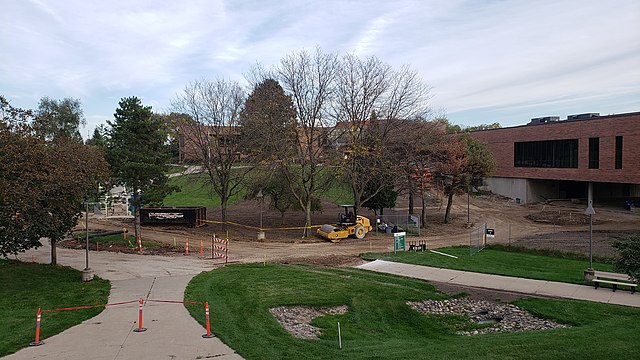Yesterday, I wrote about college closures. There seems to be a growing trend among community colleges of closing campuses and programs. In the coming years, I would expect to see more – not less – of this kind of activity, as community colleges scale back to meet demand.
Oakland Community College announced earlier this month that it will close the Highland Lakes campus in 2025. Highland Lakes was one of OCC’s two original campuses. Prior to serving as a community college, Highland Lakes was the site of the Oakland County Tuberculosis Sanitorium, which opened in 1926. OCC used the hospital building for classroom space until 2013, when it demolished “Highland Hall.”
OCC Highland Lakes is in the far southwest corner of Waterford Township. Closing the campus is going to make it very difficult for students in Waterford Township to get to other OCC campuses. Highland Lakes is nearly 13 miles away from Auburn Hills, the next closest OCC campus. Other options in Farmington Hills, Southfield and Royal Oak are even farther. Farmington Hills is nearly 15 miles away. Southfield is nearly 25 miles away, and Royal Oak is nearly 30 miles away.
Ninety-one percent of adults living in Waterford Township have a high school diploma. Only 27% of them have a bachelor’s degree. According to US Census Bureau data, about 26% of Waterford Township residents have at least some college coursework, and only 8% have an associate degree.
Currently, OCC has about 800 dual-enrolled students; they want to move that number to the thousands. Closing Highland Lakes will make it virtually impossible for high school students in Waterford Township to dual-enroll for in-person classes at OCC. That doesn’t mean that high school students there can’t (or won’t) enroll in online classes, but it certainly complicates things for them.
Virtual education isn’t a solution for everyone
According to the US Census Bureau, in 2021, 91% of Waterford Township households had a broadband internet connection. So, people in most households will be able to take classes virtually. Co-incidentally, I’m sure, 9% of people in Waterford Township live in poverty.
Closing Highland Lakes also makes it harder for residents to justify getting a two-year degree. If they have to leave Waterford to go to school, the smarter move is to get a four-year degree. It’s inherently dangerous (for Waterford Township) to watch its college-age population leave for school – because most of those who leave in search of university degrees don’t come back. Waterford has been losing young adults for the past three decades.
And there’s the issue of tax support. Waterford Township residents provided nearly $4M in tax support for Oakland Community College in 2022. In 2025, when Highland Lakes closes, they’ll still send in their $4M (or so), but many fewer township residents will be able to access OCC.
“Tax support” is a two-sided coin. There is a very limited amount of developable land in Waterford these days. Limited land means limited development and limited growth. So, this relatively uncontaminated 155-acre parcel of land – which has been off the tax rolls for nearly one hundred years – looks pretty good to the township government. For better or worse, it is unlikely to fight the decision to close Highland Lakes. Returning this parcel to tax-producing status is going to go a long way toward easing Waterford Township’s pain. (Not counting the residents for whom driving to Auburn Hills (or farther) is not practical, of course.)
Taxpayers will demand innovation from community college
These issues are just some of the questions that community colleges will face in the coming years. Simply put, cuts to services and programs decrease the value of community colleges. It’s a well that community colleges administrators can go to only so many times. A strategy that relies heavily on cuts and eliminations but delivers little in the way of innovation and change will inevitably raise the question among taxpayers of whether continued tax support is even merited. If community colleges expect continued taxpayer support after significant service cuts, they will need to find ways to not only increase their value to taxpayers, but also to remain connected to their communities.
Photo Credit: 42-BRT , CC BY-SA 4.0
























